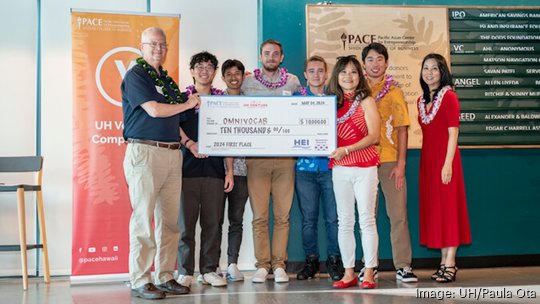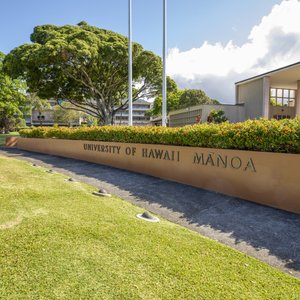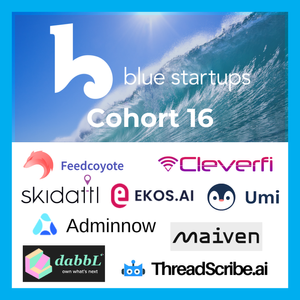
A language education startup, OmniVocab, was this year’s winner of the annual University of Hawaii Venture Competition.
The student-run venture aims to help people master different languages through an app that provides users with immersive experiences through virtual reality and artificial intelligence.
According to a release from the university announcing OmniVocab as the winner, the team was comprised of UH Manoa students Ryan Beattie, Josiah Kila, Kaihehau Goo, Sage Suzuki and Noah deMers. Kila, Suzuki and deMers are all computer science majors, while Goo studies management and Beattie majors in mechanical engineering. Their coach was Patricia LaPorte, a marketing lecturer at the Shidler College of Business.
Held annually and run by the Pacific Asian Center for Entrepreneurship at the Shidler College of Business at UH Manoa, the UH Venture Competition is a semester-long experiential learning program that takes students through the process of starting a business — from developing a business plan to pitching investors. Participating student companies go through a series of educational workshops, networking events and coaching sessions throughout the program, and it culminates in a final event where teams pitch their ideas to a panel of judges and a live audience.
This year’s final event took place May 4 at the Walter Dods Jr. RISE Center, the university’s live-learn-work center that stands for Residences for Innovative Student Entrepreneurs.
The competition began with about 40 teams, and by the time the final round took place, it was down to four finalists. In addition to OmniVocab, the other three finalist teams were:
- EduKits Hawaii, a nonprofit organization that creates placed-based STEAM resource kits for Title I school students. The team included Candide Krieger and Samantha Alvarado.
- Tadish, a mobile app that allows users to record and rate individual dishes and provides them with personalized food recommendations based on their history of liked dishes. It was created by Alyssia Chen and Timothy Huo.
- AgiPower, which designs and builds customized aquaponic systems. The team members were Kurt and Ted Metrose.
Each of the four finalists received prize money, along with other resources for their ventures. EduKits took second place, winning $5,000 from PACE and more than $40,000 in in-kind prizes. In third place, Tadish earned $2,500 as part of a prize package totaling $17,000, and in fourth place, AgiPower won $1,000.
OmniVocab’s first place prize included $10,000 from Hawaiian Electric Industries and Hawaiian Electric, along with a number of other prizes, including: marketing consultation by Pineapple Tweed ($5,000 value), a prototype development or digital marketing package from Blue Logic Labs ($4,000 value), one year of unlimited coworking membership to The Hub Coworking Hawaii ($19,500 value), and business services sponsored by Vantage Counsel LLC ($7,500 value).
In a video recording of the group’s final pitch presentation shared with Pacific Business News, the students who created OmniVocab said they developed the app after conducting interviews with language learners, instructors, and analysts and experts to identify four pain points when it comes to mastering a foreign language: not having access to other speakers; feeling bored by the material; not receiving feedback; and not having access to the native environment where the language is spoken.
To combat these pain points, OmniVocab offers a virtual reality experience to “simulate a foreign country” and through artificial intelligence, it can replicate “nuanced interactions with native speakers,” team member Kila said during the presentation.
“Imagine that you can learn Italian by walking the streets of Rome, or you can order your favorite sushi in Japan,” he said.
Team member deMers further explained, “Throughout our interviews, we concluded a study abroad type of program is one of the most effective ways for language acquisition. … But unfortunately not everybody has the means to do a study aboard program, whether it be time or money, so OmniVocab can bring that study abroad experience to you.”
The AI function, meanwhile, also can offer real-time feedback on the user’s responses.
In a demo the group showed of a lesson during the presentation, the user interacted with a virtual AI instructor that asked different questions and asked them to fetch objects from within the simulation. When the student responded, the instructor explained why their answer was correct or incorrect.
While the product is not to market yet, the students said they have been conducting research with government clients.
“We’re thrilled to showcase the incredible passion, creativity and perseverance displayed by all participants in the 2024 UH Venture Competition,” PACE Executive Director Sandra Fujiyama said in a statement. “It’s inspiring to see innovative entrepreneurs at UH, like OmniVocab, paving the way for transformative solutions in language education.”






